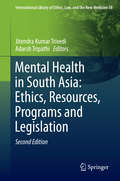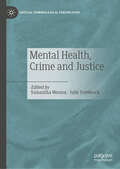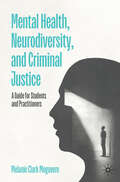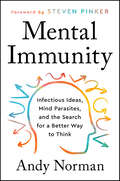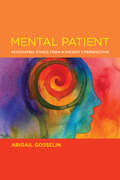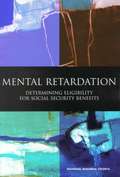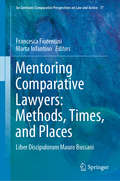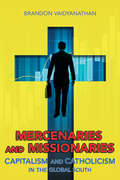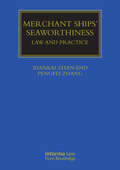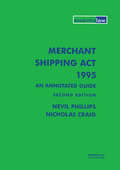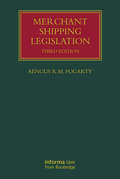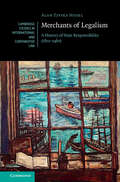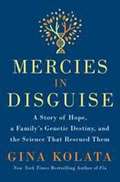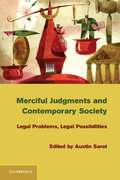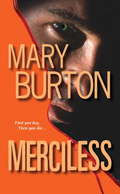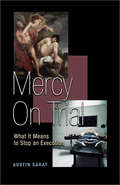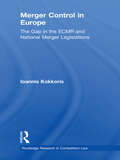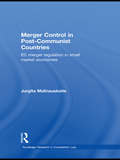- Table View
- List View
Mental Health in South Asia: Ethics, Resources, Programs and Legislation
by Jitendra Kumar Trivedi Adarsh TripathiAsia is by far the largest continent in the world in terms of area with population exceeding 3. 5 billion and has dozens of cultures, religions, languages and ethnic groups. As a result of its highly varied political systems, Asia also spawns a wide variety of health care systems including mental health care systems, often based on historical roots and at times colonial heritages. The people who suffer from mental or neurological disorders in the continent form a vulnerable section of society and often face stigma, discrimination and marginalization in all societies, and this increases the likelihood that their human rights will be violated This book tackles the issue of mental health legislation in South Asia The first of its kind, it addresses an issue that is necessary for protecting the rights of people with mental disorders and serves as an essential text for reinforcing mental health policy in South Asia It is a timely addition to our global understanding of mental health and how different regions address it.
Mental Health, Crime and Criminal Justice: Responses and Reforms
by Jane Winstone<p>It has long been known that the pathway through the criminal justice system for those with mental health needs is fraught with difficulty. This interdisciplinary collection explores key issues in mental health, crime and criminal justice, including: offenders' rights; intervention designs; desistance; health-informed approaches to offending and the medical needs of offenders; psychological jurisprudence, and; collaborative and multi-agency practice. <p>This volume draws on the knowledge of professionals and academics working in this field internationally, as well as the experience of service users. It offers a solution-focused response to these issues, and promotes both equality and quality of experience for service users. It will be essential reading for practitioners, scholars and students with an interest in forensic mental health and criminal justice. </p>
Mental Health, Crime and Justice (Critical Criminological Perspectives)
by Samantha Weston Julie TrebilcockMental Health, Crime and Justice brings together original and state of the art contributions from theoretical, empirical, and policy-related scholarship concerned with the ways people with mental health illnesses are understood, ‘managed’, ‘controlled’ and responded to. Drawing on critical scholarship from a variety of disciplines, the collection pays careful attention to the controversial relationship between mental health and crime, as well as key issues relating to justice and social harm. It presents a synthesis of discipline-specific approaches, from law, psychiatry, sociology, and criminology, but will also bridge together developments in both theory and practice. The book explores the relationship between mental health and crime by deconstructing and analysing two important facets of the justice system: (1) the various ways in which people with mental disorder navigate and are navigated through the criminal justice (and forensic mental health) system(s); and (2) how so called ‘problematised populations’ are governed, with a particular emphasis on mental health as an unfolding dimension of social harm. Unique to this volume, well-rehearsed debates are cross-examined with contemporary critiques about social harm and justice. By considering the multifaceted dimensions of violence to include ‘gendered’, ‘structural’, and ‘systemic’, this book provides a nuanced insight that exposes the controversial relationship that is said to exist between mental health and crime. The collection seeks to highlight the harm and injustice that people with mental health disorders are subject to when interacting with the criminal justice system.
Mental Health, Legal Capacity, and Human Rights
by Vikram Patel Michael Ashley Stein Faraaz Mahomed Charlene Sunkel Juliana Lynn RestivoSince adoption of the Convention on the Rights of Persons with Disabilities and the interpretive General Comment 1, the topic of legal capacity in mental health settings has generated considerable debate in disciplines ranging from law and psychiatry to public health and public policy. With over 180 countries having ratified the Convention, the shifts required in law and clinical practice need to be informed by interdisciplinary and contextually relevant research as well as the views of stakeholders. With an equal emphasis on the Global North and Global South, this volume offers a comprehensive, interdisciplinary analysis of legal capacity in the realm of mental health. Integrating rigorous academic research with perspectives from people with psychosocial disabilities and their caregivers, the authors provide a holistic overview of pertinent issues and suggest avenues for reform.
Mental Health, Neurodiversity, and Criminal Justice: A Guide for Students and Practitioners
by Melanie Clark MogaveroThis book is a critical and thorough examination of the relationship between the criminal justice and mental health systems. The chapters cover a wide range of populations, focusing on those with neurodevelopmental disabilities, specifically autism and intellectual disability, mental illnesses such as post-traumatic stress disorder and schizophrenia, substance use disorders, and juveniles. This book covers the entire criminal justice process from initial contact, police questioning, the court system, community and custodial correctional systems, and the forensic mental health system. Specific topics addressed include community interactions and crisis intervention, comprehension of Miranda warnings, competency to stand trial, eyewitness identification procedures, admissibility of expert testimony, defenses of legal responsibility, community corrections, and ethical concerns with incarceration and eligibility for capital punishment. This book also covers the history and development of the criminal justice, juvenile justice, and mental health systems to contextualize modern-day policies and practices. With student-friendly features, current terminology, inclusive language, and key findings for criminal justice practitioners, this book serves as both a textbook and extensive reference for courses and for those seeking to learn more about these diverse populations and to have a positive impact. The content has international implications.
Mental Immunity: Infectious Ideas, Mind-Parasites, and the Search for a Better Way to Think
by Andy Norman“Mental Immunity is the perfect vaccine for the mind-viruses infecting our culture: alternative facts, fake news, and conspiracy thinking, to name a few.” —Michael Shermer, publisher of Skeptic magazine and author of The Believing BrainAstonishingly irrational ideas are spreading. Covid denial persists in the face of overwhelming evidence. Anti-vaxxers compromise public health. Conspiracy thinking hijacks minds and incites mob violence. Toxic partisanship is cleaving nations, and climate denial has pushed our planet to the brink. Meanwhile, American Nazis march openly in the streets, and Flat Earth theory is back. What the heck is going on? And what can we do about it? In Mental Immunity, Andy Norman shows that these phenomena share a root cause. We live in a time when the so-called “right to your opinion” is thought to trump our responsibilities. The resulting ethos effectively compromises mental immune systems, allowing “mind parasites” to overrun them. Conspiracy theories, evidence-defying ideologies, garden-variety bad ideas: these are all species of mind parasite, and each of them employs clever strategies to circumvent mental immune systems. In fact, some of them compromise cultural immune systems—the things societies do to prevent bad ideas from spreading. Norman shows why all of this is more than mere analogy: minds and cultures really do have immune systems, and they really can break down. Fortunately, they can also be built up: strengthened against ideological corruption. He calls for a rigorous science of mental immune health—what he calls “cognitive immunology”—and explains how it could revolutionize our capacity for critical thinking.A practical guide to spotting and removing bad ideas, Mental Immunity is a stirring call to transcend our petty tribalisms, and a serious bid to bring humanity to its senses.
Mental Patient: Psychiatric Ethics from a Patient’s Perspective (Basic Bioethics)
by Abigail GosselinA philosopher who has experienced psychosis argues that recovery requires regaining agency and autonomy within a therapeutic relationship based on mutual trust.In Mental Patient, philosopher Abigail Gosselin uses her personal experiences with psychosis and the process of recovery to explore often overlooked psychiatric ethics. For many people who struggle with psychosis, she argues, psychosis impairs agency and autonomy. She shows how clinicians can help psychiatric patients regain agency and autonomy through a positive therapeutic relationship characterized by mutual trust. Patients, she says, need to take an active role in regaining their agency and autonomy—specifically, by giving testimony, constructing a narrative of their experience to instill meaning, making choices about treatment, and deciding to show up and participate in life activities. Gosselin examines how psychotic experience is medicalized and describes what it is like to be a patient receiving mental health care treatment. In addition to mutual trust, she says, a productive therapeutic relationship requires the clinician&’s empathetic understanding of the patient&’s experiences and perspective. She also explains why psychotic patients sometimes feel ambivalent about recovery and struggle to stay committed to it. The psychiatric ethics issues she examines include the development of epistemic agency and credibility, epistemic justice, the use of coercion, therapeutic alliance, the significance of choice, and the taking of responsibility. Mental Patient differs from straightforward memoirs of psychiatric illness in that it analyses philosophic issues related to psychosis and recovery, and it differs from other books on psychiatric ethics in that its analyses are drawn from the author&’s first-person experiences as a mental patient.
Mental Retardation: Determining Eligibility For Social Security Benefits
by Committee on Disability Determination for Mental RetardationCurrent estimates suggest that between one and three percent of people living in the United States will receive a diagnosis of mental retardation. Mental retardation, a condition characterized by deficits in intellectual capabilities and adaptive behavior, can be particularly hard to diagnose in the mild range of the disability. The U.S. Social Security Administration (SSA) provides income support and medical benefits to individuals with cognitive limitations who experience significant problems in their ability to perform work and may therefore be in need of governmental support. Addressing the concern that SSA’s current procedures are consistent with current scientific and professional practices, this book evaluates the process used by SSA to determine eligibility for these benefits. It examines the adequacy of the SSA definition of mental retardation and its current procedures for assessing intellectual capabilities, discusses adaptive behavior and its assessment, advises on ways to combine intellectual and adaptive assessment to provide a complete profile of an individual's capabilities, and clarifies ways to differentiate mental retardation from other conditions.
Mentoring Comparative Lawyers: Liber Discipulorum Mauro Bussani (Ius Gentium: Comparative Perspectives on Law and Justice #77)
by Marta Infantino Francesca FiorentiniThis volume features papers written in honor of Mauro Bussani, and celebrates the work and contributions of this renowned scholar of comparative law. The content reflects the various theoretical and practical areas in which he has already left a lasting mark. The essays explore the theory and practice of comparative law in different areas and contexts, and highlight innovative approaches to a large variety of hot-topic private and public law subjects. The authors include young scholars, lawyers, legal consultants, human rights activists, and practitioners, all of whom Professor Bussani has trained, supervised, and supported throughout their careers. The contributions emphasize the many ways in which Professor Bussani’s teaching and scientific output have enriched, revolutionized, and challenged both theory and practice. They cover e.g. the law of secured transactions, Western law and legal pluralism, fashion law, contract law in China and in the Arab World, contract and tort in the West, scientific evidence, risk regulation, global finance, human rights indicators, anti-discrimination laws, democracy and climate change law.
Mercenaries and Missionaries: Capitalism and Catholicism in the Global South
by Brandon VaidyanathanMercenaries and Missionaries examines the relationship between rapidly diffusing forms of capitalism and Christianity in the Global South. Using more than two hundred interviews in Bangalore and Dubai, Brandon Vaidyanathan explains how and why global corporate professionals straddle conflicting moral orientations in the realms of work and religion. Seeking to place the spotlight on the role of religion in debates about the cultural consequences of capitalism, Vaidyanathan finds that an "apprehensive individualism" generated in global corporate workplaces is supported and sustained by a "therapeutic individualism" cultivated in evangelical-charismatic Catholicism.Mercenaries and Missionaries uncovers a symbiotic relationship between these individualisms and shows how this relationship unfolds in two global cities—Dubai, in non-democratic UAE, which holds what is considered the world's largest Catholic parish, and Bangalore, in democratic India, where the Catholic Church, though afflicted by ethnic and religious violence, runs many of the city's elite educational institutions. Vaidyanathan concludes that global corporations and religious communities create distinctive cultures, with normative models that powerfully orient people to those cultures—the Mercenary in cutthroat workplaces, and the Missionary in churches. As a result, global corporate professionals in rapidly developing cities negotiate starkly opposing moral commitments in the realms of work and religion, which in turn shapes their civic commitment to these cities.
Merchant Ship's Seaworthiness: Law and Practice (Maritime and Transport Law Library)
by Pengfei Zhang Xiankai ZhanThe seaworthiness of merchant ships plays a critical role in ensuring the safety of life and property and the prevention of marine pollution. It deals with the fitness and readiness of a ship and its fundamental ability to sail safely to its destination. The standards of seaworthiness extend to literally all aspects of a ship, including the human element, physical structure, documentation, cargo worthiness and so on. It is one of the most complicated concepts in the maritime regulatory regime, and it takes many forms. However, although one of the most important terms in maritime transportation and ship management, seaworthiness is not an absolute concept, but a relative one, dependent on the particular environment, context and facts, and the standards of seaworthiness have changed greatly with the introduction of new maritime regulations over the years. The existing literature on seaworthiness is found within a variety of dedicated articles or book chapters. This book summarizes all that information in one publication and provides an update on key books that are now more than a decade old. In addition, it also offers more detail on specific aspects that are rarely discussed on their own. The reader will gain an understanding of the constituent features which colour its application in sovereign jurisdictions, where each have their own, often conflicting, social or geopolitical priorities to meet. Each chapter relies heavily on case studies to illustrate how the laws which reflect private laws and national policy underpinning those priorities are applied in practice. This structure then enables an understanding of the problems in the carriage of goods by sea, with a view to offering options for solutions. The book is written to meet the needs of lawyers, maritime professionals and academics, to thoroughly explain the concept of seaworthiness and the relevant legal issues.
Merchant Shipping Act 1995: An Annotated Guide
by Nevil Phillips Nicholas CraigThe long-awaited consolidation of the UK merchant shipping legislation finally arrived with the passing of the Merchant Shipping Act 1995 which replaced the thirty or so Acts dating from the Merchant Shipping Act 1894. This new edition of Merchant Shipping Act 1995 - An Annotated Guide provides an authoritative and practical guide to the implications of this important legislation.Written in a clear and accessible style, the authors guide you chronologically through each of the Act's 313 sections. They include expert commentary and analysis to assist your understanding and interpretation of the Act.Merchant Shipping Act 1995 - An Annotated Guide is an essential first-stop reference guide, providing guidance on the appropriate authorities and more detailed texts to which further reference can be made. It is also annotated throughout with comprehensive tables and indexes, making it a truly practical working tool. Thoroughly revised and up-dated, the second edition includes details of Amendments to the Merchant Shipping Act 1995 The Merchant Shipping and Maritime Security Act 1997 Statutory instruments and regulations introduced to supplement the Merchant Shipping Act The most recent case law Updated references to other texts, which have themselves been updated in the last 4 years
Merchant Shipping Legislation (Lloyd's Shipping Law Library)
by Aengus R M FogartyNow in its third edition, Merchant Shipping Legislation is a useful tool tool for those wishing to refer to the UK and Commonwealth merchant shipping statutes. Organized in subject areas and regularly updated, this complete annotation and commentary on the UK and Commonwealth merchant shipping legislation will be of use to the work of maritime lawyers in the UK and overseas. All the provisions of the various merchant shipping acts are contained in a single easy-to-use volume organized in subject areas. Divided into twenty chapters, the work addresses all the most important areas including: registration; collisions; salvage; pilotage; environmental protection; oil pollution and carriage of goods.
Merchants of Legalism: A History of State Responsibility (1870–1960) (Cambridge Studies in International and Comparative Law)
by Alan Tzvika NisselSince the United Nations finalised its Draft Articles on the Responsibility of States for Internationally Wrongful Acts in 2001, most of the attention has been on the codification history of the topic. Alan Nissel widens the historic lens to include the pre-United Nations origins, offering the first extensive study on the American contribution to the modern law of state responsibility. The book examines the recurring narrative of lawyers using international law to suit the particular needs of their clients in three key contexts: the US turn to international arbitration practice in the New World, the German theorisation of public law in the setting of its national unification, and the multilateral effort to codify international law within world bodies. This expanded historical framework not only traces the pre-institutional origins of the code, but also highlights the duality of State responsibility doctrines and the political environments from which they emerged.
Mercies In Disguise: A Story of Hope, A Family's Genetic Destiny, and the Science That Rescued Them
by Gina KolataIf your family carried a mutated gene that foretold brutal illness and you could find out if you inherited it, would you do it? Would you confront it, accepting whatever the answer was? Or ignore it while you could? In Mercies in Disguise, acclaimed New York Times reporter and best-selling author Gina Kolata tells the story of the Baxleys, an upstanding family in small-town South Carolina. Some family members were doctors; still, they are baffled by an inscrutable illness. Finally, after a remarkable sequence of providential events, they discover the cause of the disease. Science, meanwhile, progressing for fifty years along a parallel track, handed the Baxleys not a cure but the answer to a question--a blood test that would reveal who had the gene for the disease--and a dilemma: fertility specialists had created a way to spare the children. Mercies in Disguise tells the story of a family who took matters into their own hands when medicine could not help. It's a story of a family who must deal with unspeakable tragedy without being driven apart. And it's the story of a young woman--Amanda Baxley--who faced the future, determined to find a way to disrupt her destiny. GINA KOLATA is a writer and medical reporter for The New York Times. She has previously written five books and edited three collections of popular science writing. Ms. Kolata lives with her husband in Princeton, New Jersey.
Merciful Judgments and Contemporary Society
by Austin SaratMerciful Judgments and Contemporary Society: Legal Problems, Legal Possibilities explores the tension between law's need for and dependence on merciful judgments and suspicions that regularly accompany them. Rather than focusing primarily on definitional questions or the longstanding debate about the moral worth and importance of mercy, this book focuses on mercy as a part of, and problem for, law. This book is a product of the University of Alabama School of Law symposia series on 'Law, Knowledge and Imagination'. It explores the ways law is known and imagined in a diverse array of disciplines, including political science, history, cultural studies, philosophy and science. In addition, books produced through the Alabama symposia explore various conjunctions of law, knowledge and imagination as they play out in debates about theory and policy and speak to venerable questions as well as contemporary issues.
Merciful Judgments and Contemporary Society: Legal Problems, Legal Possibilities
by Austin SaratMerciful Judgments and Contemporary Society: Legal Problems, Legal Possibilities explores the tension between law's need for and dependence on merciful judgments and suspicions that regularly accompany them. Rather than focusing primarily on definitional questions or the longstanding debate about the moral worth and importance of mercy, this book focuses on mercy as a part of, and problem for, law. This book is a product of the University of Alabama School of Law symposia series on 'Law, Knowledge and Imagination'. It explores the ways law is known and imagined in a diverse array of disciplines, including political science, history, cultural studies, philosophy and science. In addition, books produced through the Alabama symposia explore various conjunctions of law, knowledge and imagination as they play out in debates about theory and policy and speak to venerable questions as well as contemporary issues.
Merciless
by Mary BurtonNo Pity Each skeleton is flawless--gleaming white and perfectly preserved, a testament to his skill. Every scrap of flesh has been removed to reveal the glistening bone beneath. And the collection is growing. . . No Compassion. When bleached human bones are identified as belonging to a former patient of Dr. James Dixon, Detective Malcolm Kier suspects the worst. Dixon was recently acquitted of attempted murder, thanks to defense attorney Angie Carlson. But as the body count rises, Kier is convinced that Angie is now the target of a brutal, brilliant psychopath. No Escape Angie is no stranger to the dark side of human nature. But nothing has prepared her for the decades-long legacy of madness and murder about to be revealed--or a killer ready to claim her as his ultimate trophy. . .
Mercy
by Jodi PicoultTHE INTERNATIONALLY BESTSELLING AUTHOR'We defy you not to be gripped' GlamourAs police chief of a small town, Cameron McDonald makes the toughest arrest of his life when his own cousin Jamie comes to him and confesses outright that he has killed his terminally ill wife. But was it murder, or mercy?It's a question that will divide the town as a heated murder trial blazes on, forcing them to face the hardest questions of the heart: when does love cross the line of moral obligation? And what does it mean to truly love another?THE BOOK OF TWO WAYS, Jodi's stunning new novel about life, death and missed opportunities is available to pre-order now.
Mercy
by Jodi PicoultExploring highly charged emotional and ethical issues, MERCY is the thought-provoking novel from New York Times bestselling author Jodi Picoult.There is no doubt that Jamie Macdonald killed his wife. But was it murder, or mercy?The case divides the small town of Wheelock. For Police Chief Cameron Macdonald, there's no question that he should be tried and face life imprisonment for Murder One.But Jamie's victim was dying of cancer. He claims she asked for his help to die. And there are those who believe he has suffered enough . . .(P)2006 Hodder & Stoughton Audiobooks
Mercy For Animals: One Man's Quest to Inspire Compassion and Improve the Lives of Farm Animals
by Gene Stone Nathan RunkleA compelling look at animal welfare and factory farming in the United States from Mercy For Animals, the leading international force in preventing cruelty to farmed animals and promoting compassionate food choices and policies. Nathan Runkle would have been a fifth-generation farmer in his small midwestern town. Instead, he founded our nation’s leading nonprofit organization for protecting factory farmed animals. In Mercy For Animals, Nathan brings us into the trenches of his organization’s work; from MFA’s early days in grassroots activism, to dangerous and dramatic experiences doing undercover investigations, to the organization’s current large-scale efforts at making sweeping legislative change to protect factory farmed animals and encourage compassionate food choices.But this isn’t just Nathan’s story. Mercy For Animals examines how our country moved from a network of small, local farms with more than 50 percent of Americans involved in agriculture to a massive coast-to-coast industrial complex controlled by a mere 1 percent of our population—and the consequences of this drastic change on animals as well as our global and local environments. We also learn how MFA strives to protect farmed animals in behind-the-scenes negotiations with companies like Nestlé and other brand names—conglomerates whose policy changes can save countless lives and strengthen our planet. Alongside this unflinching snapshot of our current food system, readers are also offered hope and solutions—big and small—for ending mistreatment of factory farmed animals. From simple diet modifications to a clear explanation of how to contact corporations and legislators efficiently, Mercy For Animals proves that you don’t have to be a hardcore vegan or an animal-rights activist to make a powerful difference in the lives of animals.
Mercy on Trial: What It Means to Stop an Execution
by Austin SaratOn January 11, 2003, Illinois Governor George Ryan--a Republican on record as saying that "some crimes are so horrendous . . . that society has a right to demand the ultimate penalty"--commuted the capital sentences of all 167 prisoners on his state's death row. Critics demonized Ryan. For opponents of capital punishment, however, Ryan became an instant hero whose decision was seen as a signal moment in the "new abolitionist" politics to end killing by the state. In this compelling and timely work, Austin Sarat provides the first book-length work on executive clemency. He turns our focus from questions of guilt and innocence to the very meaning of mercy. Starting from Ryan's controversial decision, Mercy on Trial uses the lens of executive clemency in capital cases to discuss the fraught condition of mercy in American political life. Most pointedly, Sarat argues that mercy itself is on trial. Although it has always had a problematic position as a form of "lawful lawlessness," it has come under much more intense popular pressure and criticism in recent decades. This has yielded a radical decline in the use of the power of chief executives to stop executions. From the history of capital clemency in the twentieth century to surrounding legal controversies and philosophical debates about when (if ever) mercy should be extended, Sarat examines the issue comprehensively. In the end, he acknowledges the risks associated with mercy--but, he argues, those risks are worth taking.
Merger Control Worldwide
by Maher M. Dabbah K. P. E. Lasok QCMerger Control Worldwide is a comprehensive, multi-contributor collection which sets out the details of every jurisdiction where a mechanism for merger control is in place. A concise, practical account is given of the relevant law in each jurisdiction, presented with the aid of flowcharts and diagrams. Merger Control Worldwide aims to provide the legal community, in particular law firms and policy-makers, with a clear point of reference that will prove invaluable when making decisions and delivering sound and accurate advice in merger cases. This, the first supplement to Merger Control Worldwide, provides an update on developments that have occurred recently in the field. It includes a comprehensive appraisal of two new jurisdictions, Korea and Mexico.
Merger Control in Europe: The Gap in the ECMR and National Merger Legislations (Routledge Research in Competition Law)
by Ioannis KokkorisThis book addresses the phenomenon of mergers that may result in non-coordinated effects in oligopolistic markets. Such cases are sometimes referred to as "non-collusive oligopolies", or "gap cases" and there is a concern that they might not be covered by the substantive test that some Member States use for merger assessment. Ioannis Kokkoris examines the argument that the European Community Merger Regulation (Regulation 4064/89) did not capture gap cases and considers the extent to which the revised substantive test in Regulation 139/2004 deals with the problem of non-collusive oligopolies. The author identifies actual examples of mergers that gave rise to a problem of non-coordinated effects in oligopolistic markets, both in the EU and in other jurisdictions, and analyses the way in which these cases were dealt with in practice. The book considers legal systems such as United Kingdom, United States, Australia and New Zealand. The book investigates whether there is any difference in the assessment of non-collusive oligopolies between the various substantive tests which have been adopted for merger assessment in various jurisdictions. The book also looks at the various methodological tools available to assist competition authorities and the professional advisers of merging firms to identify whether a particular merger might give rise to anticompetitive effects and explores the type of market structure in which a merger is likely to lead to non-coordinated effects in oligopolistic markets.
Merger Control in Post-Communist Countries: EC Merger Regulation in Small Market Economies (Routledge Research in Competition Law)
by Jurgita MalinauskaiteThis book provides a critical analysis of merger control regimes in the former socialist countries with small market economies, looking at the unique challenges facing these economies. Questions will be asked as to what extent these countries have had to follow dictation from the EU and whether this implementation of EU merger control rules has been justified from the point of view of these countries' economic situations. The book will analyse the merger control regimes in Estonia, Latvia and Lithuania, Slovenia and Slovakia. However, reference will be made to other small market economies of the EU including Cyprus, Ireland, Luxembourg and Malta in order to evaluate the particular difficulties the former socialist countries with small market economies have had in the implementation and further development of merger control rules.
